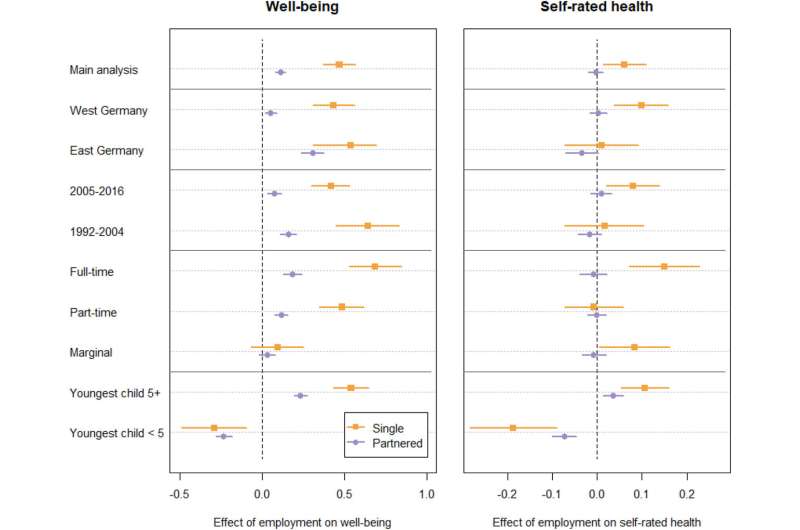This article has been reviewed according to Science X's editorial process and policies. Editors have highlighted the following attributes while ensuring the content's credibility:
fact-checked
peer-reviewed publication
proofread
Employment has a positive effect on maternal well-being, but women with very young children may need more support

The number of working mothers in Germany has been rising for years, and they find themselves constantly balancing between work and family. Research shows that being employed has a positive effect on a person's health and well-being.
However, no research has examined how employment affects the well-being and health of single mothers and cohabiting mothers. Dr. Mine Kühn of Tilburg University (NL) and Dr. Christian Dudel of the Max Planck Institute for Demographic Research (MPIDR), together with Prof. Martin Werding of the Ruhr University Bochum, have recently investigated this question.
One mother, many roles
Women often have more than one role in the family. They go to work, maintain the home, and care for the children. For single mothers, the juggling act is particularly difficult because there is no division of labor in the household and they lack the emotional and material support of a partner.
"In our study, we looked at how mothers' well-being and health changed as they transitioned into the workforce. We compared single mothers with mothers living in a partnership," explains Mine Kühn. The study analyzed the period between 1992 and 2016 throughout Germany using data from the German Socio-Economic Panel (SOEP).
Positive effect strongest among single mothers
The study shows that both single mothers and mothers with partners benefit from employment. Both groups show improvements in well-being and health. However, the positive effect on well-being and health is significantly greater for single mothers than for cohabiting mothers.
"Since single mothers are often under great financial pressure, which is also reflected in our data, one might assume that the increase in household income with increasing employment is the main reason for higher well-being and better health. However, our results show that income alone is not the reason. We hypothesize that a greater sense of financial independence from ex-partners or the state and additional social ties promote mothers' well-being. Gainful employment thus strengthens social identity and self-esteem," says Kühn. The increase in women's well-being is greatest among single mothers who work full time compared to mothers without employment.
Differences between East and West Germany
There were no significant differences between single mothers in eastern and western Germany.
In both parts of the country, therefore, the employment of single mothers seems to be socially accepted. The situation is different for mothers in partnerships. Here, the increase in well-being after taking up employment is significantly higher among East German women than in West Germany.
"The study shows the historically grown differences between East and West Germany. In the old federal states, the concept of the welfare state was based on the male breadwinner with a relatively low proportion of mothers in employment, whereas in the new federal states, mothers had to be employed," explains Kühn.
High stress for mothers with young children
The burden on mothers with at least one child under the age of five is very high in both groups. Women whose youngest child is in this age group have great difficulty in balancing everyday life, family and work. In fact, taking a job leads to a deterioration in well-being and health for both groups.
"Gainful employment is important for both single women and mothers in couple households. There are positive effects on well-being and health for both groups. Single mothers benefit even more because of their particular situation—and not only in terms of income. Overall, however, there is still much to be done in Germany to ensure that mothers with very young children are not burdened by employment. Further supportive policy measures are urgently needed, such as improving reliable, high-quality all-day childcare, especially for very young children," says Kühn.
The research is published in the journal Social Science Research.
More information: Mine Kühn et al, Maternal health, well-being, and employment transitions: A longitudinal comparison of partnered and single mothers in Germany, Social Science Research (2023). DOI: 10.1016/j.ssresearch.2023.102906
Journal information: Social Science Research
Provided by Max-Planck-Institut für demografische Forschung




















